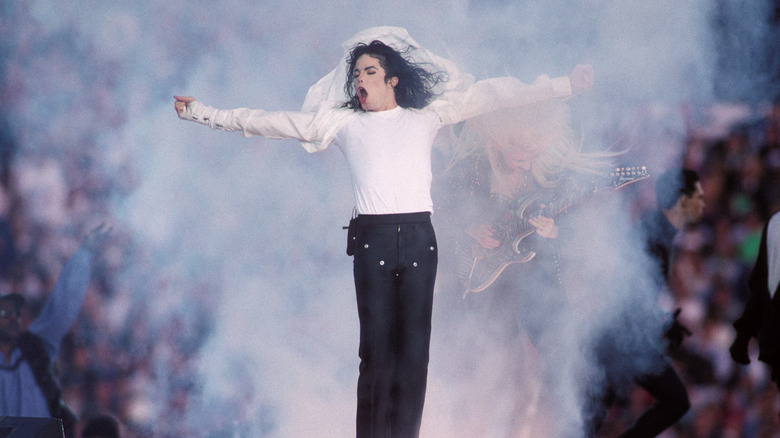'80s Musicians Who Became Unbelievably Poor
No matter how much success you have, it is still possible to end up flat broke. Actors have lost all their money, athletes go bust all the time, and even billionaires have filed for bankruptcy. So, of course, musicians are not exempt from the difficulties of managing both their fame and their finances. Plenty of bands and solo artists who hit it big in the 1980s have found themselves looking at an empty bank account even though they had spent years — sometimes decades — recording and touring.
The reasons these success stories lose it all (or at least a huge chunk of it) vary. Some simply lived beyond their means, others were screwed over by people they trusted, and still others filed for legal reasons. The results of these downfalls vary just as much, with many of these stars managing to build up even bigger fortunes in the years since, while others have just managed to get a comfortable life together. For a couple, however, it ended more tragically than that.
While having "nothing" might look a little different when someone believes they should have millions, here are some '80s musicians who became unbelievably poor.
La Toya Jackson
Perhaps La Toya Jackson was never going to be as famous as several of her siblings, but she gave it a good try. She released her debut solo album in 1980, and another five albums before the decade was out. These barely made a dent in the charts, and her biggest success was supplying background vocals on her brother Michael's "Thriller" album.
Despite this lackluster chart history, her last name was still Jackson, which promoters knew would bring crowds. So in 1992, she was hired for a six-month residency at the Moulin Rogue in Paris. Jean Miguel, artistic director of the famous venue, told The New York Times, "People tend to think of us as old-fashioned. That is why you have to try experiments like La Toya Jackson. You have to try to innovate." Reporters were unimpressed with her show, despite her husband/manager trying to convince everyone she was the next Josephine Baker and seeding rumors that her brother Michael was going to come see her perform any day now. Then La Toya bailed on the gig altogether. According to Francois Chateau, one of the Moulin Rouge's lawyers, "She stopped performing after a few days, after an investment of more than $1 million" (via Deseret News).
The Moulin Rogue sued La Toya for walking out. In 1995, facing a $550,000 judgment from the courts, she filed for bankruptcy protection. She claimed she was unable to pay the judgment because she had less than $50,000 in assets at the time.
Dee Snider
As the frontman of Twister Sister, Dee Snider saw decent success in the 1980s. The band released six albums that made it onto the Billboard 200 chart, and three singles cracked the Billboard Hot 100, including their anthem "We're Not Gonna Take It," which reached No. 21.
But after Twisted Sister broke up, like so many bands do, Dee Snider lost all his money — not once, but twice, in quick succession at the end of the 1980s. After dealing with the financial mess he found himself in after leaving the group, Snider formed another one named Desperado. It did not go well, musically or financially. He explained how bad things were at that time to Ultimate Classic Rock: "All the while, my financial situation — which had been cleared up less than a year earlier — was quickly eroding. ... I'd been supporting ... the rest of Desperado, and all the ancillary expenses (housing, equipment, plane flights, per diems, etc.) since the end of 1987. As we prepared to head into the studio to record, almost two years later, I was already back in debt. The huge advance ... for the first album wasn't enough to save me."
After the quick end of Desperado after just one album, Snider did what he could to get back on his feet. "Double bankruptcy, my career collapsed," he told Fox News Digital. "I was riding a bicycle to a desk job, answering phones. I was married, had three kids. You know, things just went incredibly south."
Cyndi Lauper
Cyndi Lauper saw huge success in the '80s, with five singles breaking the Top 5 on the Billboard Hot 100 chart, including two that made it to No. 1. What most people didn't know was that before her career took off, Lauper had already been forced to file for bankruptcy. Originally, she was the lead singer of the group Blue Angel. They released one album, which flopped. Then their manager, Steve Massarsky, dragged the members to court, suing them for $80,000. He also wanted to retain control of the group's music rights. With zero career success at that point and no money, Cindy Lauper was forced to file for bankruptcy.
Fortunately, things started to go her way. Lauper told Rolling Stone that the judge not only eventually decided the case in her favor, but he exclaimed, "Let the canary sing!" That iconic line from a terrible time in her life stuck with her and became the title of a documentary about her career in 2023. Once she was free of Massarsky and the legal bills, she was able to start making music again and quickly found success with her iconic song, "Girls Just Wanna Have Fun."
Sadly, this wasn't the end of the Lauper family's financial problems. The singer's son tried to follow in her footsteps in the music industry, with little success. In 2025, he also declared bankruptcy, just like his mom, although in his case, it was in an attempt to avoid a judgment for a sexual assault he was accused of.
John Oates
John Oates was the famously mustachioed member of the duo Daryl Hall and John Oates, popularly called Hall and Oates. But despite big success with five No. 1 songs in the 1980s, Oates' accountant told him he was totally broke. The musician proceeded to have a panic attack that was so bad, he thought he was having a heart attack.
In his autobiography (via People), he explained how this financial disaster happened, writing, "Daryl [Hall] and I were always isolated from all that. In a sense, the situation was not dissimilar to that of a dysfunctional family. We were the kids, encouraged to enjoy the wild, crazy, protracted-adolescence life of a rock star. You know ... run around the world, get laid, bask in the spotlight, and buy a lot of s***. Let Daddy take care of the important stuff." "Daddy," meaning the people in charge of their finances, legal issues, and careers, didn't steal the duo's money, as Oates makes clear. Instead, he blames them for not preparing them for the harsh realities of fame. "I just wish [our management had] warned us that the high life we were living would have financial consequences. We weren't cheated; we were seduced" (via People).
While he got back on his feet, more financial drama was to come. When Oates tried to make a quick buck off his part of the duo's music rights in 2023, Hall had a problem with how it was handled and dragged his former partner to court, trying to stop him from selling.
Natalie Cole
Natalie Cole was famous for being the daughter of Nat King Cole, but unlike many nepo babies, she had real talent in her own right. After first finding success in the '70s, Cole had eight songs on the Billboard Hot 100 in the 1980s, peaking at No. 5 with "Pink Cadillac," and six albums on the Billboard 200. Cole's mother put her under a conservatorship because she was spending so much money on drugs.
But during this time, Cole was deeply unwell. Due to ongoing drug misuse, her mother went to court to have her daughter placed under a conservatorship. In an interview with the LA Times, Cole said, "I remember hearing my mother on the radio when she came out of the courthouse. She said, 'My daughter has been under great strain and so forth.' I was thinking, 'Poor mom. She's trying to uphold the family name.' That was a hard thing for her to do, but there was no one else I could turn to."
Part of the reason may have been for family pride and to try to get her clean, but it was also to protect Cole's finances. She said, "I wasn't a vegetable by any means, but I just wasn't able to take care of things in the way they should have been. I was negligent about a lot of things. ... I was spending totally too much money." Cole would get clean after two stints in rehab and continued making music.
If you or anyone you know needs help with addiction issues, help is available. Visit the Substance Abuse and Mental Health Services Administration website or contact SAMHSA's National Helpline at 1-800-662-HELP (4357).
Billy Joel
Billy Joel's music charted from the 1970s to the 1990s, but his biggest success was in the '80s, the decade when he released all three of the singles that hit No.1 on the Billboard Hot 100. Despite this, it was also the decade when Billy Joel found out he'd lost all his money because of financial mismanagement by his former manager, Frank Weber (who was also his former brother-in-law).
Joel told The New York Times Magazine that it was misplaced pride that kept him from keeping better track of his finances: "I always had this sense that, okay, I'm an artist and I shouldn't have to be concerned about something as banal as money, which is baloney. ... I didn't pay any attention to it, and I trusted other people, and I got screwed."
An audit estimated Joel was out $30 million. Despite this, having grown up poor, he knew that he still had a lot. "I never went without a meal. I just didn't have the money I was supposed to have. ... There was a rumor that I filed for bankruptcy — that never happened, either. I owed Uncle Sam a couple of million bucks in income tax, and the money that I thought was there, wasn't there."
The musician took his former manager to court, suing him for $90 million. In the end, Joel only managed to get about $8 million in an out-of-court settlement after Weber filed for bankruptcy protection. Not nothing, but nowhere near what he was owed.
Michael Jackson
You'd be forgiven for thinking that Michael Jackson — the King of Pop, one of the most famous people in the world, with hits spanning decades — was rolling in dough. After all, 1982 saw him release what is still the best-selling album of all time, "Thriller." But years after his death, it was revealed that the King of Pop was $500 million in debt when he tragically died in 2009, at the age of 50. At the time, he was preparing for what would have been a major world tour, and considering what we now know about how pressed he was financially, the stress of getting it right must have been huge.
Testifying at the wrongful death trial brought by the Jackson estate against his former doctor in 2013, the pop star's former accountant explained (via the LA Times) how bad of shape his finances were in: While Jackson spent huge amounts on jewelry and the upkeep of his over-the-top Neverland Ranch, which was a money pit, "consistently, his largest expenditure was interest expense. He spent a ton of money on interest." Years later, a court filing (via The Guardian) would back this up, stating that Jackson was drowning under "debt and creditors' claims, with some of the debt accruing interest at extremely high interest rates, and some debt in default."
The total amount he owed in various ways came to an estimated $500 million. Jackson's death added to that debt, with his estate forced to pay the promoter of the tour that would never happen $40 million.
Meat Loaf
Meat Loaf (real name Marvin Lee Aday) released his smash hit album "Bat Out of Hell" in 1977 and rode that wave of success into the next decade. Despite two albums and one single charting in the 1980s, it was not a good time for the rocker. The fortune he'd made from his success to that point was consumed by lawsuits with his ex-manager and his label, resulting in Meat Loaf being stripped of his money.
He told the LA Times, "I ended up bankrupt. I lost my house and everything — even the publishing rights to my songs, which the bankruptcy court took away. But I'm not the first artist who has ever been screwed. It happens all the time." There was no foolproof way of measuring album sales at the time, but Meat Loaf started to think his label was undercounting sales of the still-hugely-popular "Bat Out of Hell" to avoid paying him the royalties he was owed. He said, "They didn't mind making a ton of money on my album. Is it too much to ask for them to pay what they owe me?"
The rocker was still in court in the '90s, trying to get the royalties he said he was owed. He told The Guardian, "There's not an artist alive, or will ever be alive, that has ever been paid what they are owed. You just need to know that going in. If you sign with a record label, be prepared — you won't get all your money. It's not going to happen."
Chaka Khan
Chaka Khan has done well for herself over the years, staying on top of what was happening with her money and her career. She told Jet in 1985, "I keep in touch with my accountant. I speak to my manager daily. You have to have a certain business sense."
Perhaps it was her lawyers that Khan should have kept on speed dial because the singer has found herself in court many times over the years. She was warned about this early on. When she tried to free herself from a contract with Curtis Mayfield's record label in the 1970s, he sued her for some of the profits she had made at another label. When she called him to ask what he was doing, Mayfield asked Khan if she had ever been sued before; she said no. "Well," he replied, "hang in there. You'll be sued a lot. It's cold out there" (via The Macon News).
Khan has lost many lawsuits over the years, forcing her to pay millions in lawyers' costs and settlement fees. These included: a suit from her landlord, claiming she kept a dog in her home –against the terms of her lease — and the dog attacked someone; a production company who took her to small claims court over $5,000 she owed them for working on a Hawaiian concert, and most tragically, the $1.3 million she was ordered to pay in a wrongful death lawsuit when her son shot and killed his friend in her home.
Run-D.M.C.
Run-D.M.C. had a string of firsts for a rap group in the 1980s, including the first platinum album and first Rolling Stone cover. So it was pretty surprising when they filed for bankruptcy in 1993, even though they'd taken their label to court over royalty and contract disputes in 1988. While their label said the group only filed for bankruptcy in an attempt to get out of their contract, the members insist they were flat broke.
While they did manage to get a better contract out of their legal gambit, going to court messed with their success, causing them to lose even more money. The album that was meant to be released around that time was delayed over a year as a result of the legal issues, and it ended up feeling dated. It did not do well, despite the group feeling very proud of it originally.
Run-D.M.C. came to an end as a group with the sudden tragedy of member Jam Master Jay's murder in 2002. Even then, it turned out that his finances were not in great shape. "We're not going to discuss his personal finances in detail," Run told Rolling Stone at the time, "but as a family, we're going to make sure right there is no debt. We're not going to let [his widow] Terri go through any insecurity."










